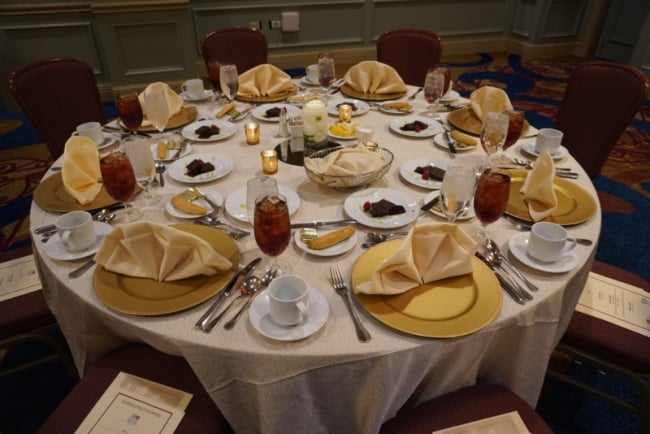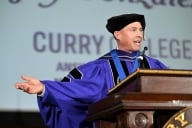You have /5 articles left.
Sign up for a free account or log in.

Etiquette dinners help students build confidence in fine dining and give them the skills to be successful in a formal business setting.
University of Houston Downtown
Employers say many young people lack key workplace skills and professionalism. A January survey found over half of hiring managers who have interviewed Gen Z candidates say the candidate wasn’t dressed appropriately (58 percent) and struggled with eye contact (57 percent). Even after being hired, one-third of hiring managers say their Gen Z staff don’t dress professionally or use appropriate language for work.
Career centers at colleges and universities often help students in preparing their interview materials and in their job search, but some take professional development one step further by hosting an etiquette dinner to teach students proper dining habits.
What’s the need: Formal dinners are common in the professional world, whether for meetings, networking, a conference or an interview, so preparing students for their lives after college includes preparing them to present their best selves while dining.
Beyond proper utensil use, business meals have their own social norms and codes about how to dress and engage with other diners, so an etiquette dinner helps students navigate the social elements of the event as well.
A college-led etiquette dinner is a more relaxed environment for students to learn expectations and put them into practice alongside the peer group without the fear of judgment or misstep.
How it works: During an etiquette dinner, career center staff teach the basics of proper dining, including how to:
- Introduce oneself to strangers with confidence
- Use a napkin, silverware and glassware
- Engage with wait staff
- Decide what to order (and what not to)
- Select appropriate conversation topics
- Determine who will pay and tip
The dinners are a formal occasion, so students dress up in their most professional attire, another learning opportunity about how to navigate eating in nicer clothing. Most events have multiple courses to show students how they differ and what is appropriate at each stage of the meal.
Sometimes the event will have a cocktail hour to provide experience navigating alcohol and the more fluid social scene.
At Nichols College in Massachusetts, staff have also provided conversation prompts during an etiquette dinner to help students foster conversations and involve all parties.
From the Experts
For more information on how to present oneself during an interview meal, Rebecca Aanerud and Jerry Baldasty provided insight for academics in an Inside Higher Ed Views piece.
Who attends: Depending on the department hosting the event, student attendance varies. At the University of Houston Downtown, the college of business holds etiquette dinners each spring and fall for business students, for example.
Often, outside groups are invited to participate to give students real-life networking opportunities, such as alumni or local industry partners. Carroll College in Montana’s etiquette dinner this year was sponsored by local businesses and allowed undergraduate and graduate students to meet potential employers.
No meal required: An in-person dining experience can help students prepare for a future event by giving a chance to practice those skills in real time, but colleges and universities can also put together a resource guide for students who need the extra help.
Kent State University, for example, offers students proper etiquette for different occasions and how to navigate table settings.
During remote instruction due to COVID-19, Washington State University hosted a remote etiquette dinner. Students picked up their meal (including Cougar gold cheese) to go that they could heat and eat at home while attending a virtual event.
Do you have a career prep tip that might help others encourage student success? Tell us about it.








